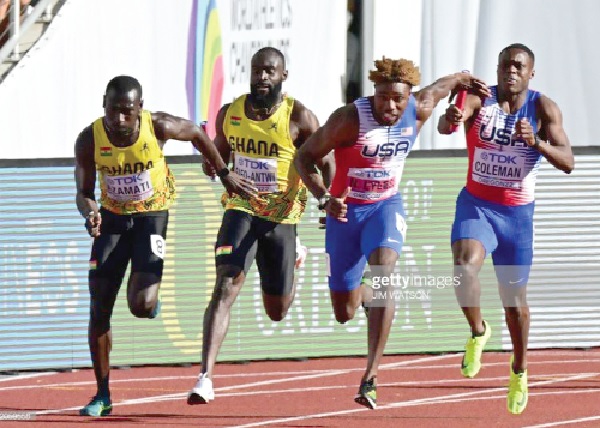
Ghana at Budapest: Why getting a medal will be an arduous task
In four days’ time the world’s best athletes will gather at the National Athletics Centre in Budapest, Hungary, for the nineteenth edition of the World Athletics Championships.
The event, which begins on August 19 and climaxes on August 27, is expected to attract over 2,000 athletes competing in 49 disciplines.
Ghana will be represented by 10 athletes who will compete in the long jump, 100m, 200m and the 4x100m.
However, with barely two weeks to the event, the nation’s top sprinter and medal prospect, Benjamin Azamati, is out of the competition due to injury.
This leaves Ghana with little to no hope of medalling at the championships, which will likely be the second in a row after zero medals in Eugene, Oregon, United States of America (USA) last year.
Ghana used to be an icon when it comes to athletics. However, in the last three decades, the paying of lip service has replaced action on the field.
This may be due to several factors. The Graphic Business examines the dwindling fortunes of Ghana’s athletics.
The challenges
1. Limited Resources and Funding: Athletics requires substantial investment in infrastructure including training facilities, equipment, coaching and athlete development programmes. However, over the years successive governments have paid little to no attention to the sport. This has led to little to no intervention with respect to investment in the discipline.
2. Lack of youth athletics competition: In decades past, intercollegiate athletics competitions were rampant in first and second cycle institutions. This produced talents who had their skills-set further honed for the national cause. This intercollegiate competitions, colloquially known as ‘InterCo’ in Ghana, among students was very vibrant and kept students active in athletics. Such competitions are rare now and virtually non-existent.
3. Sports culture and infrastructure: The country no longer harbours any sustained sports identity like in times past. Sports is now at the periphery in national matters and successive governments have made sports a back-bencher. The overall sports culture in the country and the availability of proper infrastructure play a significant role in the development of athletics. If there is a lack of a sports culture or inadequate facilities, it can impact athletes' motivation, training opportunities and overall development, which is currently the case.
4. Talent drain: In some cases, talented Ghanaian athletes may choose to represent other countries due to better training opportunities, financial incentives or other reasons. This talent drain can weaken the local athletics scene and hinder the growth of the sport within the country.
5. Limited high-level competitions: The lack of high-level competitions and exposure to international events can impede the progress and performance of athletes. Limited opportunities for athletes to compete against world-class competitors restrict their growth and hinder their ability to reach their full potential.
Addressing the issues
1. Developing local talent: Ghana could invest in identifying and nurturing promising athletes at the grass-roots level. Establishing training academies, funding coaching programmes, and organising regular competitions which will help grow the talent pool and increase the chances of success at international events. This could lead to financial gains through increased participation in tournaments and attracting sponsorship deals.
2. Infrastructure development: Investing in sports facilities, such as modern stadiums, tracks and training centres can attract international events and competitions. Hosting major sporting events not only brings revenue from ticket sales and tourism but also helps promote Ghana as a sports destination.
3. Sponsorship and endorsements: The government and private sector companies can provide financial support to athletes and national sports associations. These sponsorships can help cover training costs, equipment and travel expenses. Additionally, successful athletes can attract endorsement deals from local and international brands, providing them with financial incentives.
4. International collaborations: Ghana can enter into partnerships with other countries or sports organisations to organise joint training programmes, exchange athletes, and share expertise. This can assist in raising the profile of Ghanaian athletes on the global stage and potentially attract international scholarships and sponsorships.